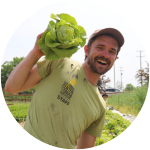Urban Agriculture and Innovative Production Advisory Committee Members

The Urban Agriculture and Innovative Production Advisory Committee is composed of 12 members appointed by the Secretary of Agriculture. Original selected members were appointed to one, two, and three-year terms with the possibility of being reappointed for one additional term. Newly appointed members will serve a standard three-year term.
- Current Members
Members of the Urban Agriculture and Innovative Production Advisory Committee are appointed by the Secretary of Agriculture. The current members as of January 2025 include:

Tony Minnick
Agriculture Park Director, Columbia Center for Urban Agriculture
Member, Related Experience Representative
MissouriMinnick has led field production at the Columbia Center for Urban Agriculture (CCUA) since 2016 and works with a dynamic team to manage Columbia's Agriculture Park, a 10-acre city park that showcases numerous innovative urban production strategies. He develops and coordinates an 8-month USDA-funded Market Gardening Apprenticeship, which trains dozens of young and beginning farmers to grow, harvest, and market a variety of specialty crops. Minnick's team donates over 50,000 pounds annually to local hunger relief outlets in Mid-Missouri.

Qiana Mickie
Executive Director, NYC Mayor’s Office of Urban Agriculture
Co-Chairperson, Related Experience Representative
New YorkQiana Mickie is New York City’s inaugural Executive Director of the Office of Urban Agriculture. Under Qiana’s leadership, the office aims to advance urban agriculture to actively address health and food disparities in the city’s natural and built environment.
By collaborating with interagency leaders as well as the breadth of urban agriculture stakeholders, Qiana has developed innovative initiatives to foster healthy, culturally relevant food production, educational trainings, and economic development opportunities for farmers and producers in the city. In the first year of her tenure, Qiana has developed initiatives such as reimagining Farm to School in NYC, building a M\WBE pipeline for small and socially disadvantaged businesses, and bolstering land security of community gardeners. She recently released NYC's first urban agriculture report and action plan.
For over 12 years, Qiana has also worked on local, state, federal, and international policy on issues such as food sovereignty, land stewardship, and health. Qiana is the former Executive Director of Just Food and Founding Principal of QJM Multiprise. Qiana began her career as a community advocate in New York City and serves on local, state, and international boards.
Jerry Ann Hebron
Executive Director, Oakland Avenue Urban Farm
Member, Urban Agriculture Representative
MichiganHebron is an active member of the Detroit Urban Agriculture community, a city considered to be the national leader in urban agriculture. She currently serves as the Executive Director of Oakland Avenue Urban Farm, a workforce development project of North End Christian Community Development Corporation (501c3). The farm specializes in growing healthy food, hosting educational programs, generating jobs, and creating cultural gathering spaces in Detroit’s North End.
One of Hebron’s many accomplishments throughout her successful career includes working to pass Detroit's Urban Agriculture Ordinance.
Kaben Smallwood
President/CEO, Symbiotic Aquaponic
Chairperson, Innovative Agriculture Representative
OklahomaSmallwood serves as the President and CEO of Symbiotic Aquaponic, a commercial and residential sustainable aquaponic systems company that he started with a loan from the Choctaw Nation and has expanded into 14 states. The company specializes in repurposing warehouses for aquaponic facilities in a cost-effective way. Smallwood brings extensive knowledge on how to bring affordable, innovative technology into communities plagued by food insecurity and historically underserved communities.
Viraj Puri
CEO/Co-Founder, Gotham Greens
Member, Innovative Agriculture Representative
New YorkAs CEO and Co-Founder of Gotham Greens, Puri operates one of the world’s largest and most commercially successful indoor farming companies including eight hydroponic greenhouse facilities in the U.S. growing local produce year-round. The company practices climate smart agriculture using 100% renewable energy, no pesticides, 95% less water than traditional agriculture, as well as green buildings.
Puri brings extensive knowledge of innovative production and addresses food insecurity by establishing food donation partnerships with food pantries and community mobile markets to ensure the neighborhoods surrounding the greenhouses have access to fresh, healthy foods. He has also cultivated key partnerships with workforce development programs and educational institutions.
Jeff Young
Director for Urban Extension, University of Kentucky – Cooperative Extension
Member, Higher Education & Extension Representative
KentuckyYoung brings over 33 years of experience with the University of Kentucky Extension and higher education, serving in many diverse administrative roles. He was appointed Kentucky Director for Urban Extension in 2019. He also serves as the National Urban Extension Leaders steering committee and Co-Chair of the Extension Committee on Programming (ECOP), Urban Agriculture and Food Systems Program Action Team.
One of his latest projects involves a community development initiative in Louisville, KY, bringing together the many agribusiness facets within a large urban community. This initiative, the Kentuckiana Agribusiness Leadership Academy (KALA), focuses on relationships, networking, and engagement of cohort members to better serve the local community.

Dr. Catherine Campbell
Assistant Professor and Extension Specialist, Department of Family, Youth, and Community Sciences, University of Florida, Institute of Food and Agriculture Sciences
Member, Higher Education & Extension Representative
FloridaSince 2019, Campbell has led a research and Extension program focused on urban agriculture and community food systems, conducting a statewide needs assessment for urban agriculture in Florida and developing educational tools, resources, and programs for policymakers, urban farmers, and community members.
Campbell brings extensive knowledge of both academic research and hands-on experience in supporting urban agriculture in the rapidly urbanizing areas. Campbell has advised multiple local governments in Florida on the adoption of policies and programs to support the development and expansion of urban agriculture and has developed and implemented programs to connect urban farms to new market opportunities and to support food access, nutrition security, and community food system resilience.
Allison Paap
Vice-President-Lending Manager, American AgCredit
Member, Agriculture Finance Representative
CaliforniaPaap has 20+ years of experience in the Farm Credit System and has been an Ag Loan Officer to urban clients for over 10 years. She currently manages $65M in loans for Southern California farmers and ranchers and oversees a team of agriculture lenders based throughout multiple counties. In this capacity, she has researched business models for farmers in highly urbanized areas, including indoor production, community, and cooperative farming.
Paap’s additional accomplishments include serving as a Director on the Board for the San Diego County Farm Bureau and Riverside Food System Alliance, as well as serving on the Urban Ag Workgroup for the Los Angeles Food Policy Council. She has also presented at the California Small Farms conference.
Rev. Dr. Carl P. Wallace
Chief Operating Officer, Abundant Life Farm
Member, Non-profit Organization Representative
OhioWallace serves as the Chief Operating Officer of Abundant Life Farm; a non-profit organization that relies on volunteers from partner churches, local boy scout troops and refugee communities to provide healthy foods for community members and learning opportunities for local students. Abundant Life Farm operates the largest approved NRCS Seasonal High Tunnel. His former church was the first recipient of a NRCS Seasonal High Tunnel in Summit County (Ohio), for which then-Congresswoman Marcia Fudge was instrumental in creating.

Dion Dawson
Founder, Dion’s Chicago Dream
Member, Food Supply Chain Representative
IllinoisDawson is the Founder & Chief Dreamer of Dion’s Chicago Dream, a nonprofit social enterprise combating food insecurity through logistics & last-mile delivery in the U.S’s Midwest region. His system provides fresh produce to the doorsteps of food insecure recipients and has provided millions of pounds of fresh produce annually to the Chicago region food system, with numerous community jobs created and one powerful movement.
Dawson is a food-fighting social entrepreneur, philanthropic leader, and founder focused on health equity through an innovative and logistical lens. Dawson's penchant for challenging the solvency of food insecurity through the stabilization of the supply chain has reinvigorated the traditional food distribution model and been met with worldwide attention. With data-driven operations, consistent quality, and a deep commitment to a resident-informed process that meets residents and recipients where they are, he prioritizes the end-user experience.
Kate Greenberg
Commissioner of Agriculture, Colorado Department of Agriculture
Member, Business and Economic Development Representative
ColoradoKate Greenberg was appointed to serve as Colorado’s first female Commissioner of Agriculture by Governor Jared Polis in December 2018. As Commissioner, Greenberg provides leadership and direction to the Colorado Department of Agriculture. She has served as president of the Western U.S. Agricultural Trade Association and the Western Association of State Departments of Agriculture, and as a board member of the National Association of State Departments of Agriculture. Prior to her role as Commissioner, Greenberg advocated for federal farm policy with the National Young Farmers Coalition out of Durango, CO, worked to restore Mexico’s Colorado River Delta, and farmed on various operations across the West.
- How to Become a Member
Solicitation for new membership nominations typically occurs on an annual basis and may include one or multiple open positions. USDA will publish nomination/application information via the Federal Register. USDA will also make additional announcements via official news and press releases.
Sign-up at farmers.gov to receive email notifications once there are vacancies on the Committee.
- Frequently Asked Questions (FAQs)
What is the Urban Agriculture and Innovative Production Advisory Committee?
The 2018 Farm Bill directed USDA to create this committee to advise the Secretary of Agriculture on the development of policies and outreach relating to urban, indoor, and other emerging agricultural production practices as well as identify any barriers to urban agriculture.
What do Federal advisory committee members do?
Federal advisory committee members have both the expertise and professional skills that parallel the program responsibilities of their sponsoring agencies. Typical responsibilities of advisory committee members include but are not limited to the following:
- Serve voluntarily without composition and solely an advisory role;
- Attend and participate in committee meetings;
- Represent the constituent industry or interest group, as appointed;
- Abide by the committee charter;
- Provide advice that is relevant, objective, and open to the public;
- Act promptly to comply work; and
- Comply with all FACA requirements and ethical guidelines.
What is the nomination process?
The USDA announces when Federal advisory committees have open nominations in several ways including the Federal Register and official press releases. Any interested person or organization may nominate qualified individuals for membership, including self-nominations. The process of nomination typically includes the submission of an AD-755 (PDF, 2.9 MB) background information form, resume, and other supplementary documents or publications. Once all documentation is received, USDA will review applications for completion and evaluate the qualifications of each nominee. The best qualified individual(s) will be recommended for appointment for which the Secretary of Agriculture will make a final selection.
What is the term limit and time commitment?
Members are appointed for a 3-year term. The Committee holds no fewer than three public meetings per year. In addition to public/open meetings there are several closed meetings scheduled on a recurring basis for administrative and preparatory purposes.
What is the criteria and qualifications to become a member?
Nominees must be able to pass a background check. Qualifications are based on experience and are unique for each open position.
Can I still apply if I’m a current member of a different committee?
Voting members may only serve on one USDA Federal advisory committee at a time.
Will I be compensated?
Federal advisory committee members serve without compensation. While engaged in the performance of their duties away from their home or regular place of business, Committee members may be allowed reimbursement for travel expenses, including per diem in lieu of subsistence, authorized by 5 U.S.C. §5703, in the same manner as a person employed intermittently in the Government service.
Why is this important?
The Urban Agriculture and Innovative Production Advisory Committee is one of several ways that USDA is extending support and building frameworks to support urban agriculture and innovative production.
What if I have a different question?
Please contact us at UrbanAgricultureFederalAdvisoryCommittee@usda.gov.
Back to Urban Agriculture and Innovative Production Advisory Committee home page











